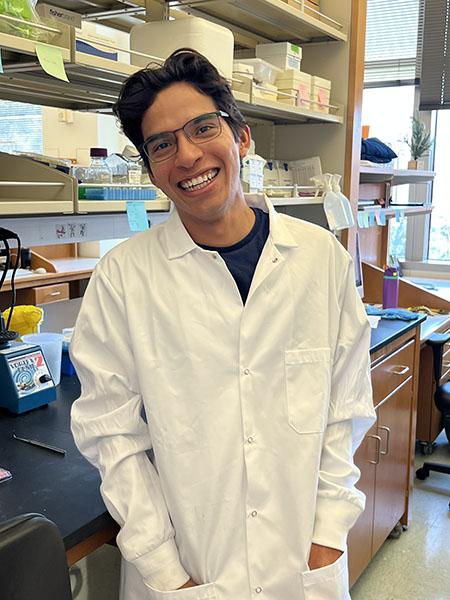Benny Mosqueira remembers his first time entering a biology lab at the beginning of his sophomore year at UC Santa Cruz. “It was like walking into Disneyland,” he says. He was mesmerized by the scientific equipment and began envisioning himself wearing the crisp white lab coat, an essential part of a science researcher’s uniform.
Mosqueira grew up in Los Angeles County and was raised by his mother and grandparents. As he began to take academics more seriously in high school, he discovered an interest in science. “It started with physics and then when I took AP Biology, it was mind-blowing to learn about the living world at such a small scale. It was the most in-depth I had ever gone in biology, so I knew I wanted to learn more” he says.
Mosqueira credits much of his academic success and access to opportunities to his involvement in UCSC organizations like Science Education and Mentorship in Latinx Lives in Academia (SEMILLA) that support STEM-passionate students who may also be BIPOC, first-generation, or from historically marginalized communities. He was also a part of his department’s DEI committee, where he contributed to the implementation of a program to pay undergraduate students for their research. Undergraduate research is typically unpaid, preventing students who can’t afford to work for free from conducting research.
Mosqueira worked for MCD Biology Professor Susan Carpenter’s lab, which he was a part of for three years, until the end of his senior year. During the same time that Mosqueira joined Carpenter’s lab, he learned about a program called STEM Diversity. He felt seen at the recruitment event, where STEM Diversity staff discussed what it is like to be a minority in STEM and how they provide students with tools to be successful.
Mosqueira eagerly applied for UC Leadership Excellence through Advanced Degrees (LEADS) through the STEM Diversity program, setting him up with two paid summer research internships and mentorship that helped him pursue a career in STEM research. He continued working for Carpenter’s lab remotely during the COVID-19 lockdown in 2020, learning computational analysis during his first UC LEADS summer internship program. Mosqueira spent his second summer research internship at UCLA. Along with providing research opportunities for students, the UC LEADS program includes professional development and graduate school application workshops, as well as academic resources like tutoring and study hours. “One of the biggest things aside from all that was having a sense of community and feeling like there’s a team supporting you,” Mosqueira says.
Now, a year after his graduation, Mosqueira is a research assistant for MCD Biology Assistant Professor D’Juan Farmer’s lab at UCLA, where he studies the development of the skull and how disrupting these growth patterns leads to craniofacial defects. Mosqueira has a more prominent role than he had as an undergrad and is in charge of creating new models in mice and zebrafish to study this phenomenon in detail.
He says it’s fun to reflect on his time in the lab as an undergraduate student at UCSC. One of the most notable memories for him was seeing his name on a scientific paper he conducted research for in Carpenter’s lab published in the Journal of Immunology, describing the role of LincRNA-Cox2 in lung injury. The research opportunities Mosqueira had and his involvement in programs committed to supporting diversity in STEM provided him with the experience and motivation to pursue research after he graduated.
Assistant Professor Farmer has been an influential mentor for Mosqueira. Farmer has not only supported Mosqueira as he applies for Ph.D. programs in MCD biology to start in the fall of 2024, but he also shares Mosqueira’s experience as a person of color in STEM and his goals to make STEM a more diverse field that is accessible for people from all backgrounds. Mosqueira greatly benefited from programs to bring diversity into STEM research as a student, and he wants to pay that forward.
Mosqueira is excited to pursue his Ph.D., not only to gain expertise but to assume a larger influence in creating more diversity in STEM.
“Research in STEM is a white male–dominated field,” Mosqueira says. “And the only way that we’re going to shift away from that trend is if people who are minorities come into STEM with high ambitions and really want to transform lab culture. I want to help the next generation.”



